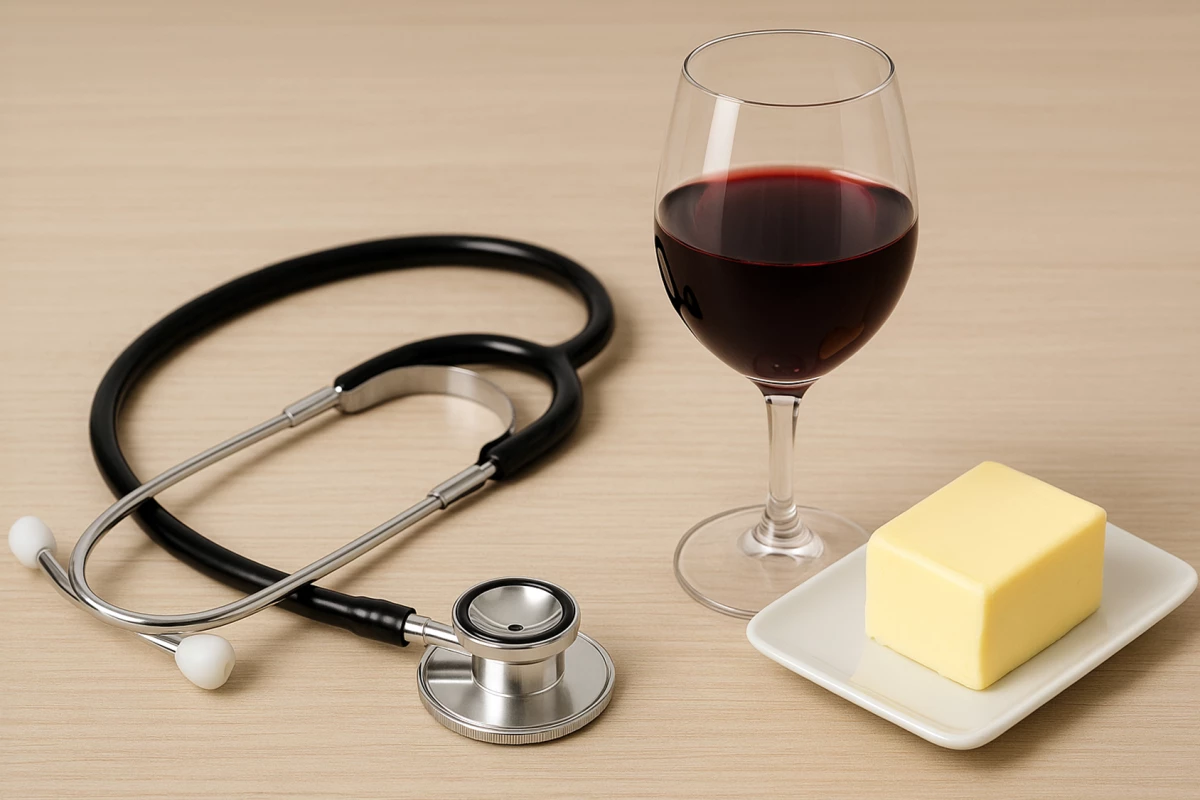Some things we eat or drink raise our risk of deadly diseases like heart disease or cancer. But, strangely, a recent paper argues that, once we have those diseases, some of the same factors can show the opposite association with survival in observational studies. This survival twist – described in the paper as a risk–survival paradox and dubbed “Cuomo’s Paradox” – raises questions about how prevention findings translate to survivorship. It doesn't, by itself, overturn current nutritional guidance.
Nutritional epidemiology, the study of how diet impacts disease risk and progression, has been key in identifying modifiable factors for chronic diseases. These include factors such as obesity, high blood pressure, high cholesterol, smoking, and alcohol consumption.
Sometimes, though, more than one piece of research will point to a paradox between a pre-diagnosis risk factor and its effect on post-diagnosis survival that challenges conventional assumptions. In a new perspective paper, Raphael Cuomo, PhD, from the Department of Anesthesiology at UC San Diego’s School of Medicine, has examined this risk-survival paradox across four dietary factors and two diseases: cancer and heart disease.
“Repeated findings showed that dietary exposures linked to disease risk were associated with better survival once disease was present,” said Cuomo. “This paper formalizes the general principle, which the scientific community has named ‘Cuomo’s Paradox,’ that nutritional factors which help prevent cancer or cardiovascular disease can be neutral or even show the opposite association with survival after diagnosis.”
Here is Cuomo’s Paradox in simple terms: A nutritional factor can raise a person's chances of getting a disease, but, in certain people and with specific nutritional choices, it can be associated with longer survival. For the present study, Cuomo focused on the factors of obesity, alcohol, cholesterol, and antioxidant supplements in relation to post-diagnosis survival in patients with cancer and cardiovascular disease.

“It should be noted that there exist some disease, such as diabetes and essential hypertension, where extant literature shows little or no evidence of risk-survival reversal, implying that the paradox may not be universal,” Cuomo explains. “In this article, I restrict our analysis to cancer and cardiovascular disease, given their prominence as global causes of death and the extensive literature documenting paradoxical survival association in these populations.”
Obesity
Many studies have shown that, before a diagnosis of disease, higher body weight raises the risk of heart problems and many cancers. After diagnosis, however, some cohorts have reported better short‑term survival among patients with higher BMI. Longer survival might be due to having extra energy reserves, differences in tumor biology or treatment tolerance, or measurement issues, such as BMI vs body composition, so it shouldn't be interpreted as evidence of obesity being beneficial.
Alcohol
Even drinking moderate amounts of alcohol has been linked to an increased cancer risk. However, for some cancers (like breast or colorectal) and in heart disease, some observational studies have reported longer survival among moderate drinkers compared with abstainers, particularly when excluding people who quit drinking due to illness (so-called "sick quitters"). Although this benefit disappears or reverses for certain cancers, including liver, head and neck cancers. It should also be pointed out that these findings are highly sensitive to confounding (e.g., “sick‑quitter” bias) and do not justify starting or continuing alcohol for survival benefits.
Cholesterol
Before disease, high levels of low-density lipoprotein (LDL or “bad” cholesterol) are a major driver of heart disease. In advanced heart failure and late‑stage illness, higher measured cholesterol has sometimes tracked with better survival, a pattern likely influenced by illness severity, inflammation, and nutritional status rather than a protective effect of high LDL. This does not argue against LDL‑lowering for prevention.
Antioxidant supplements
Antioxidants are supposed to help reduce oxidative stress, an imbalance in reactive oxygen species (ROS) or free radicals and the body’s ability to neutralize them, which causes cellular damage that is thought to contribute to cancer. However, large randomized trials have shown that some antioxidant supplements increased cancer risk in certain groups – in smokers, for example, beta-carotene may act as a pro-oxidant, worsening rather than preventing cancer. These findings demonstrate that timing, dosage, and individual biology matter, and that supplements are not uniformly beneficial and can be harmful.
“It’s always important to consider when other factors might be influencing the results, but even when studies account for things like smoking, age, existing health problems and treatment, we still see patterns that line up with Cuomo’s Paradox,” the scientist said.
Cuomo points out two of the study’s key limitations: “reverse causation” and “survivor bias.” Reverse causation is the classic "chicken-and-egg" problem seen in observational studies. Let’s say a study finds that people with low body weight die sooner after receiving a diagnosis of heart disease. At first glance, that might look like low body weight causes early death. But the reverse may be true: people who are already sicker may lose weight due to the disease or its treatment. That means the illness is causing low body weight, and the low weight is just a marker of being unwell, not the cause of poor survival. Many of Cuomo’s “paradoxes” could be partly explained by reverse causation. The other explanation, survival bias, refers to the fact that studies miss the sickest patients because they die early, and those who live long enough to be studied may already be healthier or biologically advantaged.

What Cuomo is suggesting – albeit cautiously at this stage, without further studies to back it up – is that advice on how to avoid disease (that is, prevention) might not work the same way for survivors (that is, how to live longer with the disease). Current nutrition guidelines often assume that prevention and survival are aligned, but this research suggests that they can be very different.
“Healthy should be defined relative to a person’s stage in life and goals,” he said. “Cuomo’s Paradox reframes health as prevention versus survival. My research has uncovered pre-diagnosis versus post-diagnosis as a core variable in nutrition. It became clear to me that prevention advice and survivorship advice must be separated.”
While there isn’t yet a major opinion piece from top-tier medical journals on Cuomo’s Paradox, there are several recent expert-informed commentaries and essays that discuss and respond to the concept. Care City Media, for example, urges clinicians, especially in oncology and cardiology, to rethink standard nutritional advice. It advocates for stage-specific guidelines, noting that strategies aimed at preventing disease, such as weight loss or cholesterol lowering, might undermine survival during illness unless those strategies are adapted thoughtfully. Best Info Cloud suggests moving from a one-size-fits-all approach to nutrition to a personalized approach.
Granted, not everyone will agree with Cuomo’s risk-survival paradox concept. More studies, especially randomized trials, are needed before making official changes to dietary recommendations for patients who already have cancer or heart disease.
The study was published in The Journal of Nutrition.
Source: UC San Diego School of Medicine







